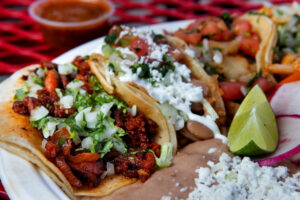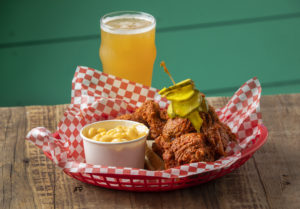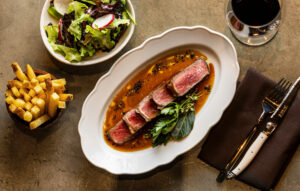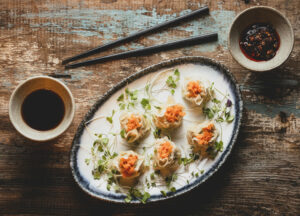
Cruising the Tuesday market with my youngest daughter, under strict orders to return home with the makings of a salad but little other guidance, we walked by Lou Preston’s stall, and were stopped in our tracks by Lou’s strawberries. As a rule, I’m not a big fan of strawberries, finding them a poster child for the over-engineered style of supermarket fruit: Big, firm, nice to look at, but overly dry and unpleasantly chalky to the tooth and so often devoid of any real taste. On Tuesday, however, with the oblique angle of the late day sun glancing off their perfectly ripe, almost impossibly red skins, Lou’s teeming baskets of rubescent little berries were like traffic lights designed to halt our egress down the aisle.

Farmer’s markets are all about quality over quantity, and the rest of Lou’s stall was a case study: Small, compact, efficient, and I wanted to eat everything in it, the rainbow-in-a-box of plump tomatoes, the short and squat sweet peppers and the long, lean, twisting, and vaguely sinister fiery ones, the progressive shading of green into crimson and yellow tracking the late-season maturation of the fruit. On the corner of the table, a wicker basket full of crusty sourdough loaves, labeled “country white”, but, to my taste, more closely resembling a dense, chewy version of the classic French miches, with its distinctive tang of rye flour. (Etymological specificity notwithstanding, I took a loaf home. It barely lasted through breakfast the next day.)

Anyway, back to dinner, and our latest installment of “Three”. Armed with strawberries of such high sugar content, I wanted something with a bit of bite to provide ballast to the dish: Green Zebra heirloom tomatoes, with higher acidity and more tartness than most of their heirloom cousins, would balance the flavor profile and a splash of color at the same time. Now, strawberries and tomatoes may or may not sound odd to you – they are both fruits, after all – but the what makes the match particularly interesting is that the tomato is a berry, while the strawberry is not: A botanist will insist that most of what we instinctively classify as berries (with the notable exception of the blueberry, which is a true berry) actually comprises a peripherally related cousin-class called aggregate fruit (many little fruits grouped together), while tomatoes (and bananas, which always surprises me)with their fruit, comprised of flesh from a single ovary, are true berries. Lest you think that’s the end of the story, the strawberry is, in fact, neither berry nor aggregate fruit, but is instead an accessory fruit, in which the edible portion has not been produced from the ovary (apparently, the little bunches of seeds are the true “fruit” of the strawberry, but I don’t really get that).
The rest, as they say, is history, because I was now short one, and only one, ingredient, and there is no more classic accompaniment to either strawberries or tomatoes than balsamic vinegar. You could make a reasonable case that balsamic vinegars, ubiquitous throughout professional and home kitchens alike, have developed into something of a crutch, and I’d likely agree. Certainly, when encountered in excess (and in increasingly suspect applications, such as a heavy-handed drizzle on the cloyingly sweet, sticky pizza I recently had the misfortune to order), their oaky sweetness has a tendency to become monolithic and wearing on the palate. Still and all, for my money, you’ll not often go wrong if you drizzle balsamic vinegar on your strawberries or tomatoes (I would almost always add olive oil and certainly salt and pepper to the latter, although not to the former, and not in combination, as in this “salad”).
I served this as a dessert, to rave reviews from a 10- and an 8-year old with particularly finicky, and not wholly adventurous tastes, so I’m thinking it’s pretty solid.
Strawberry-Tomato ‘Salad’ with Balsamic Syrup
- Pour a quarter cup (this is for about 4 plates) of good balsamic vinegar into a small sauce pan and reduce to a syrupy consistency. Watch the heat carefully – balsamic vinegar scorches easily, and even before then, with all the sugar, it will turn into caramel, which you can’t work with (if it starts to foam, start over, because by the time it cools, it’ll be a hard, sticky mess).
- While the vinegar is reducing, wash the fruit and cut the stems off the strawberries perpendicular to their long axis (i.e., so that they will stand straight up when plated on the cut side). Cut the Green Zebra into uniform small or medium dice (I cut them small and plated them in piles, but it turned out they were a little tricky to eat; I think I’d cut them larger next time, and keep the fingers out of the sticky vinegar drizzle).
- Once the vinegar syrup starts to cool and thicken, drizzle or splatter the plate and arrange the fruit on top (do it in that order, it’ll look cleaner).









